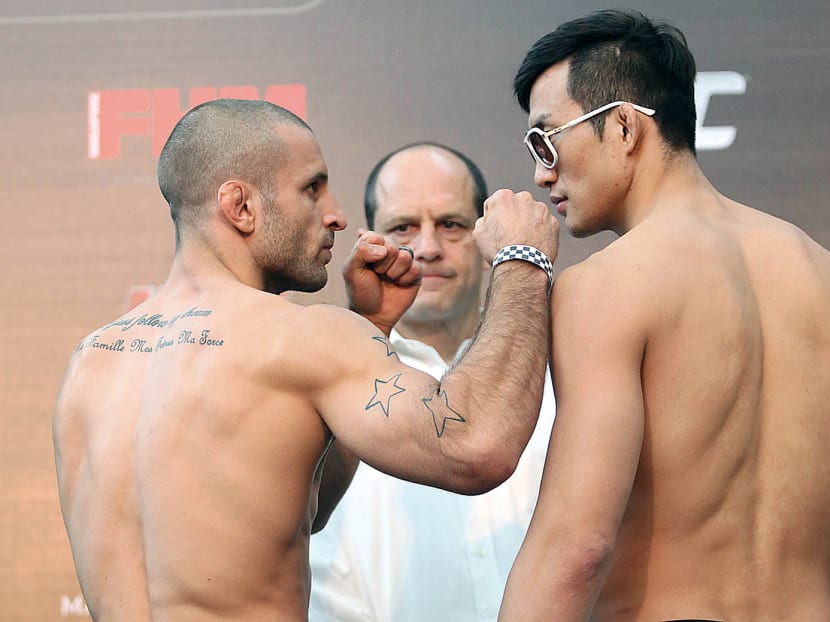Where is UFC heading in Asia?
SINGAPORE — The Ultimate Fighting Championship (UFC) adventure in Asia has entered choppy waters, with the resignations of key staff at its Asian headquarters in Singapore, which opened 14 months ago, and the closing of their China office in April.

MMA fighters Tarec Saffiedine (left) and Lim Hyun Gyu at the UFC Fight Night Weigh-in. Looking on is former UFC Asia managing director Mark Fischer (centre).
TODAY File Photo
SINGAPORE — The Ultimate Fighting Championship (UFC) adventure in Asia has entered choppy waters, with the resignations of key staff at its Asian headquarters in Singapore, which opened 14 months ago, and the closing of their China office in April.
The events culminated in the mutual parting of ways between the Las Vegas mixed martial arts (MMA) property and their Singapore-based executive vice-president and managing director Mark Fischer two months ago.
Nine other staff members also quit their posts at the UFC Asian office in Hill Street between November and April this year, including the respective directors of operations and sponsorship, James Hatcher and Jon LeFebvre, and regional director of marketing and communications Kelvin Phang.
A source, who is a China-based marketing executive and has worked closely with UFC, told TODAY differences of opinion between executives in the United States and their colleagues across the Pacific on their business operations in Asia led to the departures.
The source said management in the US wanted to replicate UFC’s successful multi-million contract in Japan — where Dentsu Inc underwrite all their events there and sell sponsorships around it — for events across the rest of Asia, particularly in China.
But the Japanese model, he argued, was unique because MMA has a 30-year history in Japan that appeals to sponsors and it would be difficult to apply it to different business cultures in the rest of Asia, where the sport is still new.
Earlier this year, Fischer said their Singapore debut at the Marina Bay Sands in January was not profitable as it generated only US$1.2 million (S$1.5 million) from 5,000-odd fans and hardly covered the cost of staging the event, which included flying in officials, participants and commercial partners.
It raises the question of whether the UFC will be able to host more events outside of Japan that are financially sound after staging three in Macau since 2012 and one in Singapore. The principal sponsors in both countries were Venetian Macao and Marina Bay Sands, who underwrote the cost of the venues.
But UFC vice-president of international business development Joe Carr said the US MMA property is committed to Asia and are working with an agency to find Fischer’s replacement, adding that UFC’s Singapore-based Asia headquarters is fully staffed and continues to lead the business development across the region.
“We have recently staged two world-class events in Macau and Tokyo, both featuring the best fighters from Asia and the world,” Carr told TODAY.
“We have close to 40 Asian fighters signed to the UFC and in the last two months, we have delivered the first female UFC fight in Asia and also the very first female Asian UFC fighter.
“We are looking forward to working with existing and new partners around the region and will continue to deliver engaging content and premium live event experiences to our fan base.”
However, he declined to say why Fischer, who has extensive business experience in Asia — he held senior positions in the region since 1988, including a 10-year spell with the NBA’s Hong Kong and Beijing offices — and helped start the UFC’s Beijing and Singapore offices in 2010 and last year, respectively, left the company.
But ongoing tensions between UFC’s American and Asian offices piled pressure on the Singapore office and took its toll on Fischer.
The China source added: “With the staff turnover, Mark was never given a chance to build a team capable of making meaningful inroads into Asia. When they closed the China office, he lost a capable team who knew a market the UFC considers a lynchpin for their Asia operations.
“You need local staff who understands the local business culture and idiosyncrasies. Without them and with pressure coming from the UFC management in the US, Mark’s task became a really high mountain to climb.”





